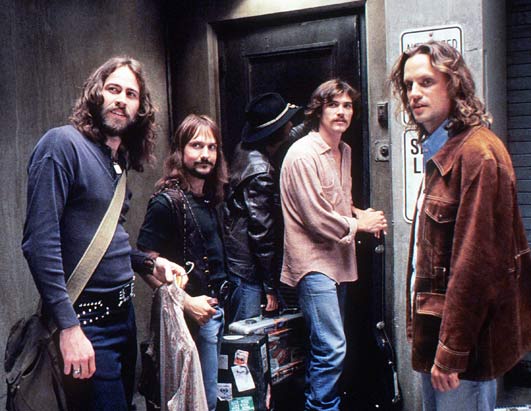A Quentin Tarantino film is an experience. It is not simply a film or a piece of entertainment but rather an event to be embraced and cherished. Some may call him self-indulgent or even overrated but to fully understand his contribution to the cinematic movement is to fully comprehend his love for the art form. He is not merely a filmmaker but rather an innovative technician who is capable of deconstructing the systematic process that is filmmaking.
The Importance of Character
He is not a filmmaker concerned with action and physical movement. Rather, he is an auteur who fully realizes the importance of character and its development. Characters exist in his filmic environments by acting and reacting to the chaotic situations that they have created for themselves. Violence is not simply in a Tarantino film for its alluring nature but rather as a statement indicating the constrictive situation his characters have found themselves in.
The Importance of Dialogue
What Tarantino may be most renowned for, however, is his focus on highly stylized modes of speech. Greatly influenced by the likes of film noir/pulp fiction writers Dashiell Hammond, Raymond Chandler and Elmore Leonard, Tarantino elicits vivid responses from his audiences by incorporating mundane banter about ubiquitous popular culture subject matters.
Though Tarantino is extremely exuberant about filmmaking; his true passion lies in the dialogue articulated by his characters. To him, the randomness and esoteric manner of the subject matter is indicative of a characters particular personality trait. It may seem like random dialect being spurted from the tongue but, in fact, it is revealing the multiple layers of depth existent within these characters souls. The fact that they appear to be “regular joes” who discuss and dissect frivolous information allows the audience to better identify themselves with these characters. As they ponder, we, the audience, ponder the absurd nature of their topics.
For instance, in ‘Reservoir Dogs’ (1992), the audience’s initial introduction to the men in black sitting around a table in a diner drinking coffee is accompanied by an in-depth discussion about what Madonna’s song ‘Like A Virgin’ truly means? This discussion, on the surface, has nothing to do with the film’s subject matter but yet the audience is enthralled by its analysis.
You see, as much as Tarantino is a talented filmmaker, he is an even better writer. The duration of his films are more then likely extended by at least a half an hour because of his admiration for the written word. In fact, it seems, at times, that Tarantino is more interested in finding opportunities for dialogue diversions then in propelling his narrative forward.
In ‘Pulp Fiction’ (1994), two men, Jules and Vincent (Samuel L. Jackson and John Travolta), are seemingly driving to an unknown destination while simultaneously dissecting the enigmatic nature of fast food and its place in European culture. The audience is unaware that these two men are in fact hit men and that they are on their way to perform a job. The randomness of their conversation diverts any feelings of mistrust on behalf of the audience member. Even though they are eventually identified as killers, the audience still feels some sort of kinship with these men. Their personality traits indicate average individuals but yet their professional jobs deem them as dangerous and sinister (outsiders). The audience’s initial interpretation of these two men has now been undermined as was the case in ‘Reservoir Dogs’ when it is found out later that the men discussing the nature of Madonna are, in fact, hardened criminals.
The Hybrid Nature of Tarantino’s Films
Tarantino is a filmmaker immensely soaked in film culture. He is truly a student of film history. He will not only embrace and pay homage to cinematic masterpieces but will also incorporate little known and unheard of films into his repertoire of cinematic infatuation (he will also incorporate many unknown and forgotten actors into his films). There are hints of John Huston’s ‘The Asphalt Jungle’ (1950), Stanley Kubrick’s ‘The Killing’ (1956) and Joseph Sargent’s ‘The Taking of Pelham One Two Three’ (1974) in ‘Reservoir Dogs’ (not to mention many Japanese films-particularly from director Ringo Lam).
‘Kill Bill’ (2003), starring Uma Thurman, incorporates many different forms of Japanese cinema into its story while 2007’s Grindhouse film ‘Death Proof’ is another entry within the Tarantino canon to incorporate his love of horrendous 1970’s cinema. Even his next film, ‘Inglorious Bastards’, a war film set for release in 2009, is said to incorporate many genres including the spaghetti western.
In 1992, ‘Reservoir Dogs’ was released to strong critical acclaim. Two years later, Tarantino delivered his masterpiece ‘Pulp Fiction’ to the world (winner of numerous awards including an Academy Award for Best Screenplay). To sum it up, within a mere sixteen years, Tarantino has changed the landscape of cinema. There have been a countless array of copycats who have attempted to cash in on his influential films but, as of yet, none have been able to fully capture the essence of a Tarantino flick. He is a special filmmaker with extraordinary storytelling capabilities. It is a thrill to witness an event like a QT film.



